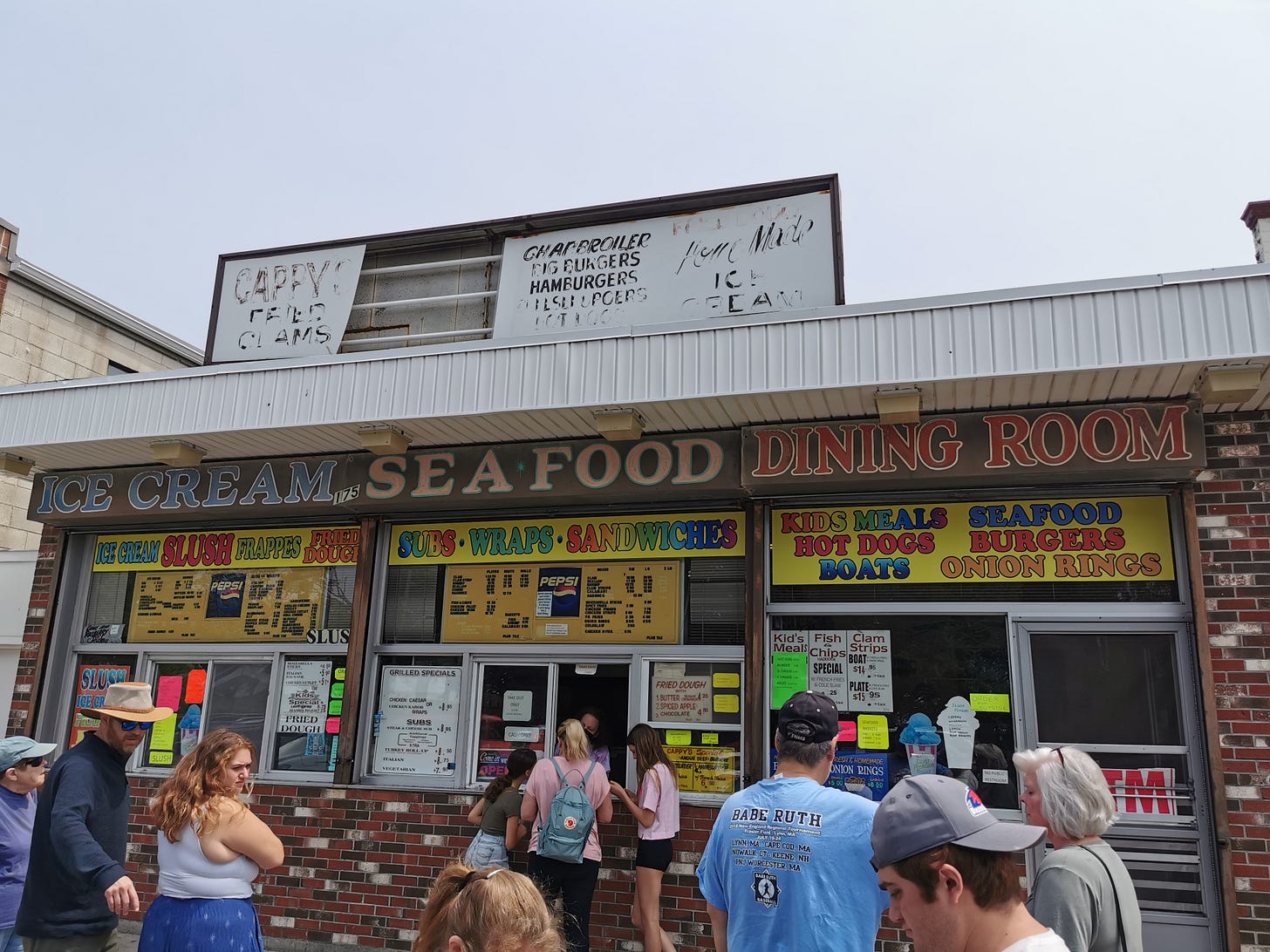Once Upon A Time In France: NUPES Alliance, Football Fiasco, And Burkini Breakdown
Is France headed toward an electoral surprise?
By now you have noticed that this newsletter had been absent from your inboxes for several weeks. I’ve been sidelined by a mix of travel, family matters, and COVID. On the latter, it appears being vaccinated 4 times did not, in fact, make me invincible.
I suspect that my turn on the COVID carousel began with a trip to Latvia for a tech conference. I spent several days exploring Riga, an underappreciated European city, followed by a weekend retreat in the countryside that included a visit to a deer farm, a delightful hike, and eating stew around a campfire. (Did you know that deer antlers are one of the fastest-growing organisms on the planet?)
My Covid symptoms kicked in the following week when our family traveled down south to the Cannes-Antibes region. There were pleasurable moments mixed with my declining health.
From there, I spent the next two weeks on my back watching the calendar. We had a long-standing family reunion planned for Boston in mid-May. I only finally got a negative COVID test the day before my flight and managed to make it to Beantown where we ate as one only can in the Boston area.
From there, my mom and aunt traveled back with me for their first-ever visit to Paris. I spent 2 weeks playing tour guide, one of my favorite things, as we saw the city like tourists and made a side trip to Normandy and the D-Day beaches and the American cemetery. Even for a cynic like me, these sites are powerful and inspiring.
Of course, now I’m back at it. And just because I disappeared, the news did not stop. In particular, we are still in the thick of election season, dear reader, here in France. And following President Macron’s re-election in May, the sequel has delivered a plot twist.
(Side note: The day after the election, just before I vanished, I joined Lindsey Tramuta on her “The New Paris” podcast to discuss the aftermath of the presidential vote).
Much of the coverage during the presidential campaign had centered around France’s drift to the right and the looming threat of the extreme right. This has been aided by a divided left that insisted on running just enough candidates so that none of them had a shot at making the second round of voting.
But…one of the mild surprises of the first round was that far-left leader Jean-Luc Mélenchon, head of La France Insoumise party, finished a much closer third than many had projected. Even as Macron spent two weeks campaigning against Marine Le Pen for the presidential election, Mélenchon turned his gaze toward the legislative elections.
France holds its national elections in 2 parts. About a month after the presidential vote, there are two rounds of legislative votes for the National Assembly. Those are scheduled for June 12 and 19. In most cases, the party that wins the presidential election sweeps to a majority in the legislative elections. But not always! There is nothing in the structure of voting that guarantees this. When a different party wins a majority, the French refer to it as “co-habitation.”
Now, typically this would be academic. But buoyed by his strong showing, Mélenchon began campaigning for the role of prime minister. Many (including me) dismissed this as quixotic nonsense initially. The president appoints the prime minister who then appoints the government ministers. The PM is a kind of chief operating officer. However, the PM and its government need some approval from the Assembly. Mélenchon’s bet is that if he could get a majority, he could pressure Macron to appoint him PM which would allow him to form the government.
Here’s where the twist comes in: Mélenchon’s party began talks with other left-leaning parties about forming a coalition for the legislative elections. Typically, such talks fall apart amid egos and political differences. But to the shock of nearly everyone, France’s left, including the traditional center-left Socialist Party, signed on to an alliance. And so was born NUPES: La Nouvelle Union populaire écologique et social. It’s an unfortunate acronym to anglophone ears, but it’s proving persuasive to voters.
Polling the legislatives is notoriously difficult because no one is actually polling each individual race. But NUPES in many polls is (are?) neck-and-neck with Marcon’s coalition (Ensemble). Calculating how that translates into the number of seats involves some statistical witchcraft.
There are 577 seats and a party needs 289 for a majority. Here’s a typical breakdown of how pollsters see things playing out. Macron’s coalition won a comfortable 348 seats in 2017. If they fall short of a majority in 2022, it could force them to create a coalition with the center-right Les Republicans (LR below).
Still, if the NUPES make a strong showing, it would at the very least provide renewed hope that France’s left has at long last got its act together. Writing for The National, Cole Stangler took a look inside the NUPES coalition and how it has tapped into several important social and economic trends:
As they call on voters to elect Mélenchon as prime minister—an unconventional strategy to boost turnout—Bensaada and many other left unity candidates are focusing on the same issues the Insoumise leader did in his presidential campaign: a hike in the minimum wage, a price cap on essential goods to fight inflation, and reinvestment in public services like health and education.
But…one of the issues that in recent years has hampered unity attempts on the left is Mélenchon himself. When speaking, he often comes off as a demagogue, and many on the left who would otherwise be natural allies find him personally repulsive. Beyond that, while he has tried to temper his views, Mélenchon has historically been anti-EU. Even during the presidential campaign, he insisted France had the right to break certain EU rules if it was in its economic or social interest (a stance that would effectively undermine any EU authority).
As the left-leaning Le Monde newspaper reminded readers this week, Mélenchon has also been effusive in the past in his praise for Putin and Russia (applauding the annexation of Crimea, for example, and saying he was campaigning against the diabolisation of Putin by the West). Even as Russia was massing troops along the Ukrainian border earlier this year, he declared the U.S. was the real aggressor. As for the U.S.: « Les Yankees représentent tout ce que je déteste. » Meanwhile, he has also refused to condemn China for human rights violations against the Uyghurs.
All of this has many on the left conflicted. Optimistic, on one hand, about signs of progressive unity. Concerned, on the other hand, about the leader of this effort. In some cases, dissident candidates on the left are still running in legislative races against NUPES candidates.
Adding a surreal touch to this: Macron has already appointed a prime minister, Élisabeth Borne, who has formed a new government. Mélenchon has taunted her as his future predecessor. That’s just a hint of the theater that France could be seeing in the weeks to come if the vote is close or if the NUPES gain a majority.
Football Fiasco
That new Macron government didn’t get much of a honeymoon. And of all things, it found itself mired in controversy over the handling of a football match between Liverpool and Madrid.
The teams were set to meet in Paris for something called the Champions League which seems to have been important based on the number of Liverpool fans swarming around the city on a Saturday afternoon in late May. Even after 2 seasons of Ted Lasso, I didn’t understand the significance of the game (in fact, I had no idea it was happening until we saw swarms of red-shirted Brits). But they seemed in high spirits and so good for them, I thought.
But the match turned out to be a fiasco for them. For reasons that remain unclear and controversial, thousands of these British fans arrived at the football stadium and were not allowed in. There were a couple of hours of chaos which eventually led to the French national police teargassing British families trying desperately to get into the match.
French officials claim 10s of thousands of Brits arrived with fake or no tickets to get in. But these claims seem to have little credibility and government officials have been ridiculed for their lack of clarity and shifting excuses. Mysteriously, much of the surveillance camera footage from the stadium that could shed light on what happened has disappeared.
In the heat of the legislative campaign, this has naturally become fodder for Macron’s critics who see it as an example of government mendacity and incompetence.
It has also left me in the unusual position of feeling bad for the British. A new and strange sensation.
Burkini Breakdown
It’s the summer season in France, which also means it’s time for the perennial freakout over the Burkini. That would be the head-to-toe bathing suit worn by some Muslim women.
In past years, local mayors have attempted to ban the burkini on beaches, saying it’s a divisive attire that oppresses women while also highlighting the growing Islamization of the country. Laïcité in France guarantees freedom of religion but it also guarantees freedom from religion.
Never mind the many national Catholic holidays, even many French progressives get pretty worked up over the burkini. And so when the mayor and city council of Grenoble voted to allow the burkini in public pools, naturally the nation lost its mind.
Macron’s government took the matter to court where RFI reports that the “interior ministry filed an objection to the ruling under the law to counter ‘Islamist separatism’ passed by parliament in August 2021 last year, which allows for the government to challenge decisions it considers undermine France’s secularism.”
The court sided with the French government, and so for now, the burkini rule is suspended in Grenoble. But the city has vowed to appeal.
Great Reads
For better and for worse, travel is on the comeback trail. And that means tourists are predicted to be flooding back to France this summer. The good news is that plenty of writers are on hand to offer fresh inspiration.
Emily Monaco (writer of the Emily in France newsletter), didn’t get her French driver’s license (a subject dear to my heart) but is consoling herself with living life in France the right way. Lindsey Tramuta visited the Loire Valley for the New York Times to see how a region famous for its châteaux is reinventing its tourism image. Anne Swardson explored Paris’ Promenade Plantée, the former railway line converted into an elevated park walkway.
On a more sober note, local officials are trying to find ways to preserve the ruins of a French town that was the site of one of the largest WWII massacres by the Nazis. Disney+ has produced a mini-series about Malik Oussekine, an Arab teenager who was killed by French police in 1986.
Finally, if you haven’t seen it, read The New York Times’ epic exploration of France’s role in Haiti and the ways it forced the country to make huge payments that kept it impoverished after it won its independence. Then read about the ensuing controversy in which academics accused the paper of basically failing to give them credit for decades of work that covered similar subjects related to post-colonial Haiti.
Expect a special update Monday following the first round of legislative voting on Sunday.
Chris O’Brien
Le Pecq












